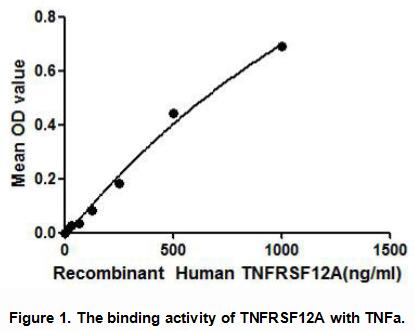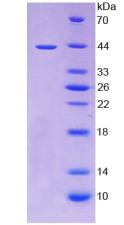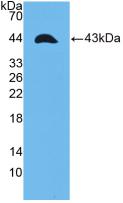Active Tumor Necrosis Factor Receptor Superfamily, Member 12A (TNFRSF12A)
CD266; TNFRSF12-A; FN14; TWEAKR; Tumour Necrosis Factor Related Weak Inducer Of Apoptosis; Fibroblast growth factor-inducible immediate-early response protein 14
- Product No.APA813Hu01
- Organism SpeciesHomo sapiens (Human) Same name, Different species.
- Buffer Formulation20mM Tris, 150mM NaCl, pH8.0, containing 1mM EDTA, 1mM DTT, 0.01% SKL, 5% Trehalose and Proclin300.
- Traits Freeze-dried powder
- Purity> 80%
- Isoelectric Point6.7
- ApplicationsCell culture; Activity Assays.
- DownloadInstruction Manual
- UOM 10µg50µg 200µg 1mg 5mg
- FOB
US$ 352
US$ 880
US$ 1760
US$ 5280
US$ 13200
For more details, please contact local distributors!
ACTIVITY TEST

TNFRSF12A (Tumor necrosis factor receptor superfamily member 12A) belongs to the Tumor necrosis factor receptor superfamily. TNFRSF12A is thought to induce apoptosis weakly in some cell types and promotes angiogenesis and the proliferation of endothelial cells. A binding ELISA assay was conducted to detect the association of TNFRSF12A with TNFa. Briefly, TNFRSF12A were diluted serially in PBS, with 0.01%BSA (pH 7.4). Duplicate samples of 100uL TNFRSF12A were then transferred to TNFa-coated microtiter wells and incubated for 2h at 37℃. Wells were washed with PBST and incubated for 1h with anti-TNFRSF12A pAb, then aspirated and washed 3 times. After incubation with HRP labelled secondary antibody, wells were aspirated and washed 3 times. With the addition of substrate solution, wells were incubated 15-25 minutes at 37℃. Finally, add 50µL stop solution to the wells and read at 450nm immediately. The binding activity of TNFRSF12A and TNFa was shown in Figure 1, and this effect was in a dose dependent manner.
USAGE
Reconstitute in 20mM Tris, 150mM NaCl (pH8.0) to a concentration of 0.1-1.0 mg/mL. Do not vortex.
STORAGE
Avoid repeated freeze/thaw cycles. Store at 2-8°C for one month. Aliquot and store at -80°C for 12 months.
STABILITY
The thermal stability is described by the loss rate. The loss rate was determined by accelerated thermal degradation test, that is, incubate the protein at 37°C for 48h, and no obvious degradation and precipitation were observed. The loss rate is less than 5% within the expiration date under appropriate storage condition.
GIVEAWAYS
INCREMENT SERVICES
-
 BCA Protein Quantification Kit
BCA Protein Quantification Kit
-
 Molecular Mass Marker for Protein
Molecular Mass Marker for Protein
-
 Monoclonal Antibody Customized Service
Monoclonal Antibody Customized Service
-
 Polyclonal Antibody Customized Service
Polyclonal Antibody Customized Service
-
 Protein Activity Test Experiment Service
Protein Activity Test Experiment Service
-
 Electrophoretic Mobility Shift Assay (EMSA) Experiment Service
Electrophoretic Mobility Shift Assay (EMSA) Experiment Service
-
 Buffer
Buffer
-
 Lentivirus Packaging Experiment Service
Lentivirus Packaging Experiment Service
-
 Adenovirus Packaging Experiment Service
Adenovirus Packaging Experiment Service
-
 Real Time PCR Experimental Service
Real Time PCR Experimental Service
-
 Spike RBD Protein (S-RBD)
Spike RBD Protein (S-RBD)
-
 Protein G
Protein G
-
 Protein A
Protein A
| Magazine | Citations |
| Analytical Biochemistry | A single molecule assay for ultrasensitive detection of Fn14 in human serum Pubmed: 31580829 |








